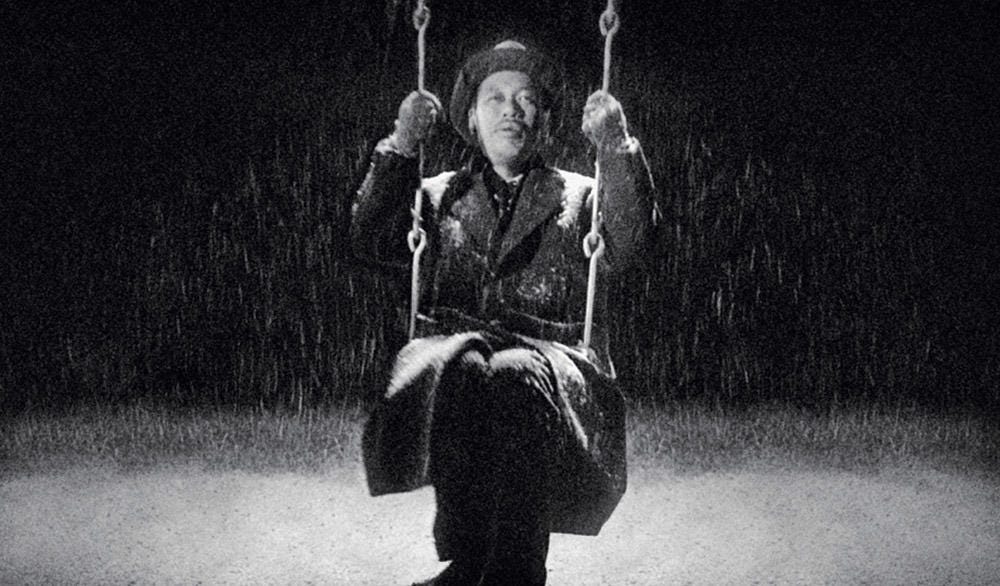Rule 7
For the past few months a good friend and I have been mulling over “rule 7” in his life principles: “do not seek happiness.” On first glance rule 7 might seem preposterous: if one is not to pursue happiness in (with?) life then what (and how) is one to be? The provocative nature of rule 7, however, is kind of its point: to force us to confront our (mis)understanding of happiness.
In part inspired by the 1952 Japanese film Ikiru (生きる, “To Live”), rule 7 asks us to confront the question of what it means to live. Ikiru tells a story about the life of Kanji Watanabe, an office worker at a monotonous bureaucratic position. He is confronted with stomach cancer with less than a year to live, and has to come to grips with a life that feels empty. How should he fill his remaining time?
The intuition of rule 7 is that, somehow, in the face of death, happiness (at least as commonly understood) doesn't feel adequate. Many things that we think are synonymous or associated with happiness don’t seem to fill the abyss: in Ikiru, Kanji Watanabe tries to live spontaneously and find escape in pleasure, but is left feeling like something is still missing. In short, one might say that there's more to life than being happy.
However, rule 7 doesn't stand alone. What does it recommend in the times when we are fortunate enough to experience happiness? If happiness is within our power should we not embrace it? Surely, rule 7 doesn't ask us to turn away from happiness? Surely, rule 7 doesn't ask us to be miserable. The uncertain status of happiness in rule 7 was vexing.
Is another rule needed? Should rule 7 be modified? We stumbled upon a surprising resonance to rule 7 in Viktor Frankl, who wrote:
“It is the very pursuit of happiness that thwarts happiness.”
At greater length, Viktor Frank posited:
“...happiness, cannot be pursued; it must ensue, and it only does so as the unintended side-effect of one's personal dedication to a cause greater than oneself or as the by-product of one's surrender to a person other than oneself.”
Instead of happiness, Viktor Frankl asks us to search for meaning. My friend pointed out that the meaning Frankl writes of is a search for our “why,” a search for “resolve” or Heidegger's “resoluteness,” for something we give ourselves utterly to. Having resolve can be fulfilling, but it can also be one of the most dangerous things, for it supersedes all other considerations of good and evil.
In many ways, resoluteness is another name for the “ultimate answer” that we all feel we are searching for. In giving ourselves utterly to it we become open to facing our end and our death. Just as answers are the end of questions, the surrender associated with resoluteness brings us to face our end, and in doing so becomes our “answer” to life. In even more essential terms, resoluteness is an “answer” not in the sense that it is a universal truth, but instead in the sense of a personal reply to life: once one has found resoluteness one no longer feels besieged by questions; questions are evaporated by resoluteness.
In the end, my friend was reminded of his “rule 0,” Nietzsche's “amor fati,” or, love of fate. In crude, simple terms, amor fati asks us to live with no regrets, to embrace our life so fully that we would love it even if it were to recur in the same way eternally. In some ways, rule 0 transcends rule 7, as rule 0 already suggests how to live.
Related to amor fati I am reminded of the namesake of this blog, “no regress,” a pun on “no regrets.” In its very conception this blog was my search for my answer to the question of (my) life: to find my resoluteness and my meaning, so to speak. A resting place that I can act from. A year later, I now find that a critical piece of the puzzle is simply arriving at a better understanding of what an answer looks like.
If one is not careful one could join the coterie of people who get lost in searching for meaning in their work and life.1 To mirror and build upon Frankl, I wonder if the very pursuit of (an object of) meaning could thwart meaning; the problem with pursuit lies in thinking about happiness or meaning as ends to arrive at, when instead they should be practiced, felt, and lived. I am also wary of the seductive power of “ultimate answers” to questions, and an accompanying singular, jealous, resoluteness to abolish all questions that would challenge one's answer to life. To this address this, I am drawn to Rilke's reminder to “live the questions now.”2
Perhaps, rule 7 should read: “Do not seek (an end).”3
Just as “there is more to life than happiness,” one could arguably also say, “there is more to life than meaning.”
Resolve to question. Perhaps our problem lies not with the questions themselves, but with our implied assumption that questions are bad in and of themselves. If we did not find questions to be intrinsically problematic then we would not find them as painful and intolerable.
Eschatological and abolitionist thinkers would probably find this abhorrent lol. A more precise phrasing is “do not seek (an end that arrives now).” I.e. a reminder not to let impatience get in the way of doing and being. I.e. don’t 拔苗助長.

